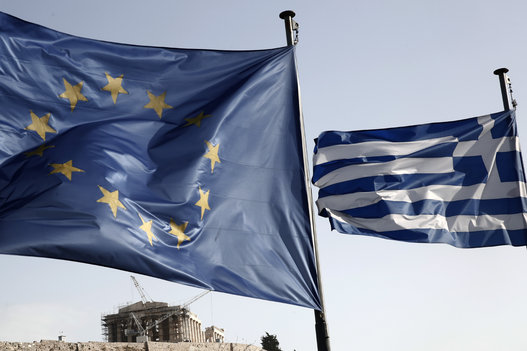The Troika of the European Commission, the European (ECB) and the International Monetary Fund (IMF) is pressing the Greek government more and more clearly to decide between the austerity recipes of the Troika and exit of the euro zone. The pressure on the Greek government is increasing by the day. Greeks withdraw deposits from the […]

The Troika of the European Commission, the European (ECB) and the International Monetary Fund (IMF) is pressing the Greek government more and more clearly to decide between the austerity recipes of the Troika and exit of the euro zone. The pressure on the Greek government is increasing by the day. Greeks withdraw deposits from the banking sector which is becoming increasingly fragile. The ECB tries to link its liquidity support for Greek banks de facto to the repayment of an IMF loan at the end of June. But as of now, the ECB does not want to take the political responsibility for a Greek default from the shoulders of EU politicians.
The Troika demands a continuation of the hitherto austerity policies: increasing indirect taxes, tax reform with further pension cuts, privatisations of basic infrastructure. As in the past, it would be workers, pensioners and the poor who would have to bear the brunt of austerity. The austerity measures are targeted at these groups because the Troika wants to reduce domestic mass demands and imports. Indeed, imports and the current account deficit have been reduced – and, thus, the need for new foreign finance. However, the Troika policies have done nothing to strengthen the weak productive structures of Greece. Industrial production has fallen even more drastically than the GDP since the beginning of the austerity policies.
The steep fall of the GDP – 23% between 2009 and 2013 – was a direct consequence of austerity. Unemployed had soared to 25.4% in February 2015. Only a small minority of the unemployed – in 2013 a mere 13% – receive unemployment benefits. Less and less Greeks still have health insurance coverage. Pensions are the only remaining social stabiliser. Therefore, pension policies are so contested between the Troika and the Syriza-led government.
The dramatic deterioration of the economic and social situation has exacerbated both private and public debt problems. The ratio public debt/GDP increased from 129.7% in 2009 to 177.1% in 2014 – in spite of a partial debt cut. Thus, the Troika policies failed in attenuating the debt problem – for the EU allegedly problem No. 1.
In view of this unsuccessful record of the policies implemented due to Troika pressures, the coalition government of left-orientated Syriza and national conservative ANEL has called for a revision of the economic policies. In particular, the government has proposed to desist from cutting pensions, the main remaining social stabiliser, and to turn to increasing taxes for the rich as well as restoring the minimum wage to pre-crisis levels and re-introducing nation-wide collective bargaining agreements instead of firm-based agreements. This is not a particularly radical programme. It just attenuates the social emergency and puts a higher tax burden on corporations and the rich. The Greek government has a clear democratic mandate for this.
Even, these moderate alternative proposals have led to an escalation with Troika and the other euro zone members. The Troika is clearly intent on destroying any alternatives to its own neo-liberal recipes. It views Greece as a possible “bad” example for other peripheral EU countries like Spain where a new left-orientated party, Podemos, has emerged and has been quite successful in recent municipal elections.
The Greek government has de facto been confronted with the alternative either to accept the Troika austerity policies or to be squeezed out of the euro zone. Both options would probably be exercised in a gradual way. Resistance to Troika policies would probably be worn down in successive asymmetrical negotiation rounds rather than broken in a specific negotiation round. In its hitherto last proposal, the Greek government already went a substantial way to address Troika demands. Inter alia, the pension age is reportedly to be gradually increased. However, direct pension cuts are not part of the Greek proposal. Instead, social security contributions are to be increased. The other option – exit from the euro zone – cannot be ruled out at the moment. Being squeezed out would probably be a gradual process rather than a sudden rupture. Strong losses of bank deposits and/or the ECB ending liquidity support might force the Greek authorities to limit withdrawals from bank accounts and to introduce controls and restrictions on international capital flows. The introduction of a parallel currency and/or the reintroduction of a national currency as well as a moratorium on international debt payments would probably follow. The immediate consequences for the Greek economy would be dramatic. However, the Greek government would regain policy spaces. And the competitive pressures on the Greek economy would diminish.
It cannot be excluded that the Greek government finally desists from its demands because it fears the high short-term costs of exiting the euro zone. However, the EU authorities have now clearly formulated the alternative euro zone membership or an end to austerity. Unless there is not a last minute change of EU policies, opposition to austerity will from now on imply challenging euro zone membership. The stakes are increased. In both main alternative scenarios – the Greek government succumbing to Troika pressures and Greece being squeezed out of the euro zone – the question of an at least partial disintegration of the euro zone is clearly on the agenda.